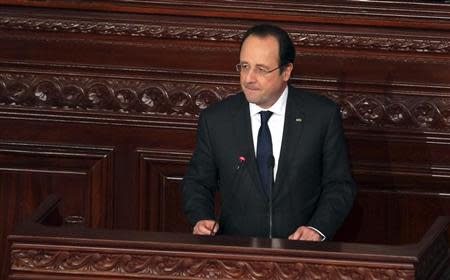Hollande visit reflects stronger U.S.-French ties despite spy row

By Steve Holland WASHINGTON (Reuters) - French President Francois Hollande starts a visit to the United States on Monday with spats over U.S. eavesdropping and trade talks with the EU unlikely to chill a relationship now far warmer than before the 2003 U.S.-led war on Iraq. Hollande, 59, who split from his partner last month after an affair with an actress, arrives solo for the first state visit hosted by President Barack Obama and his wife Michelle in nearly 2-1/2 years. The United States and France, whose alliance dates to the founding of America in the late 18th century, are working together on Iran, Syria, North Africa and other trouble spots. The collaboration is a far cry from the strains of a decade ago when France refused to join the Iraq war. "France is a solid ally of the United States but always retains its independence," Hollande told Time magazine in an interview published last week. He made clear that he shared European anger over National Security Agency practices that "should never have existed" and had caused "a difficult moment, not just between France and the United States but also between Europe and the United States". On Monday, French Foreign Minister Laurent Fabius said talks to resolve the spying issue were under way. "There was behavior that wasn't specifically targeted at France, but it was unacceptable," he told RTL radio. "So there are more talks, which are not finished, but gains have been made. The U.S., with checks in place, won't be able to spy on the president and we'll verify that this is the case." Washington's relations with the European Union have also been ruffled by a U.S. diplomat's secretly recorded expletive to disparage the EU's handling of the political crisis in Ukraine. The United States and France have cooperated in diplomacy on Syria and Iran, but do not always agree on economic issues such as a U.S.-EU trade deal on which negotiations began in July. TAX-DODGING SUSPICIONS France set down several preconditions before allowing the talks to start, insisting that the audio-visual sector, including cinema and books, be excluded from discussions. French tax authorities have also put U.S. Internet giant Google under audit about accounting procedures which channel sales through Ireland. Google rejects suggestions that this is an attempt at tax-dodging. Officials say Obama and Hollande have solid working ties. "During the visit, they will discuss opportunities to further strengthen our shared security, grow our economic and commercial partnership, and partner on the environment, climate change, and development," the White House said. Obama will showcase the old U.S.-French alliance by taking Hollande on a tour of the Monticello estate of Thomas Jefferson, the third U.S. president, who had been ambassador to France from 1785 to 1789, acquiring a taste for fine wine. Jefferson was one of the authors of the Declaration of Independence. Without French assistance, the fledgling American army might not have defeated the British colonial power. On Tuesday, after an arrival ceremony on the White House lawn, Obama and Hollande hold talks and a news conference. Hollande will have lunch at the State Department with Vice President Joe Biden and Secretary of State John Kerry. Both leaders could use any glow from the visit to lift their popularity at home. Hollande, struggling to reduce unemployment, fell to his lowest approval rating last week with only 19 percent according to a TNS Sofres-Sopra Group poll. Obama saw his rating drop to about 40 percent after the rocky rollout of his healthcare law, but it has rebounded slightly since. (Additional reporting by Alexandria Sage in Paris; Editing by Alistair Lyon)

